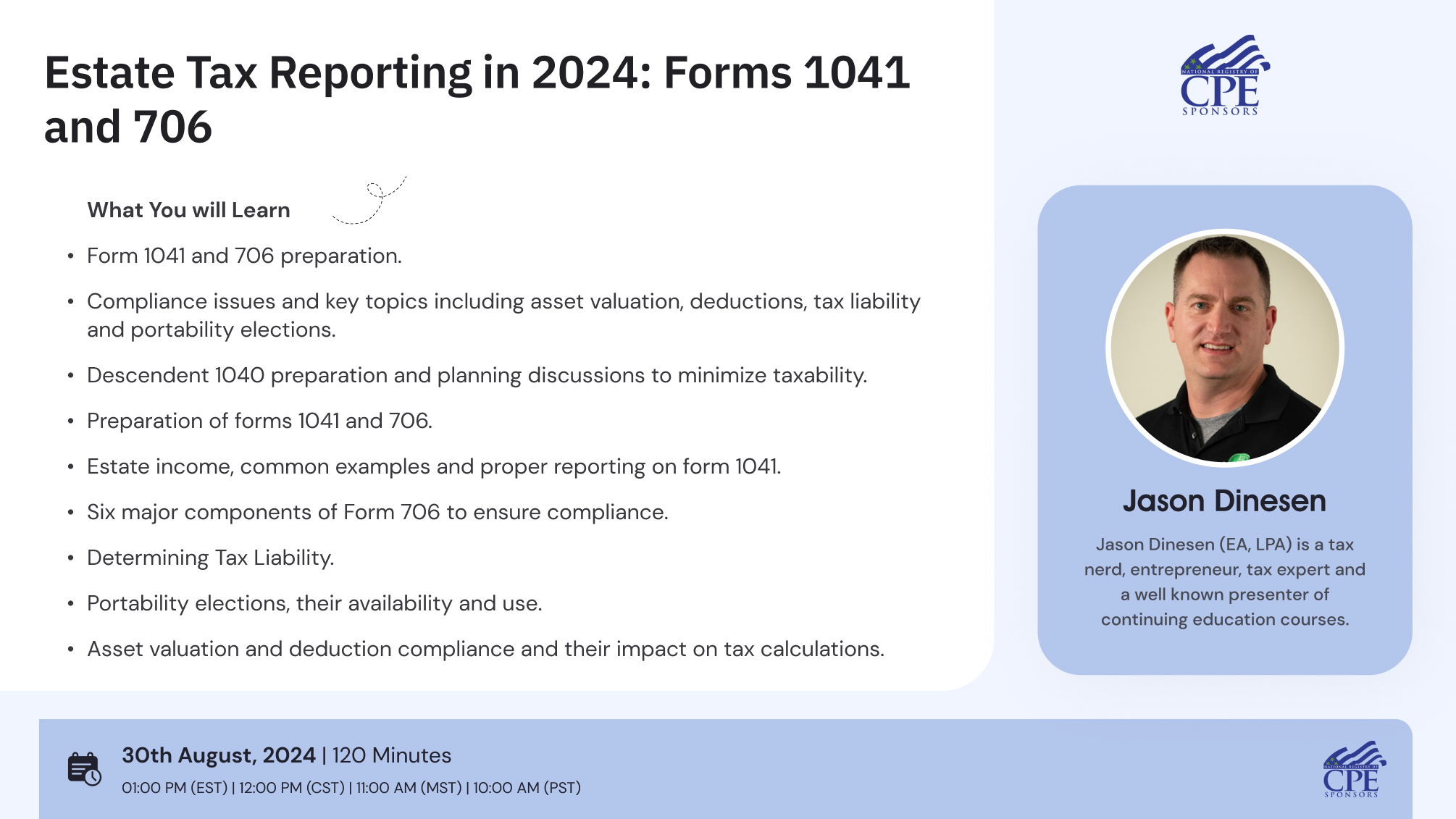Estate Tax Reporting in 2024: Forms 1041 and 706
Preparing returns for estates can be difficult, especially if you do not prepare these kinds of returns often, but these services are vital for our clients. This course provides the practitioner with a practical understanding of Federal estate law. We will examine Forms 1041 and 706 and will address how and when to prepare each form. We will also discuss planning suggestions to minimize taxation where possible for clients.
What You will Learn
- Form 1041 and 706 preparation.
- Compliance issues and key topics including asset valuation, deductions, tax liability and portability elections.
- Descendent 1040 preparation and planning discussions to minimize taxability.
- Preparation of forms 1041 and 706.
- Estate income, common examples and proper reporting on form 1041.
- Six major components of Form 706 to ensure compliance.
- Determining Tax Liability.
- Portability elections, their availability and use.
- Asset valuation and deduction compliance and their impact on tax calculations.
- The ins and outs of the “portability” rules, including how the rules actually work using common examples.
- Issues involved in the preparation of the decedent’s final federal income tax return (Form 1040).
- Income tax consequences.
You will Be Able to
- Successfully and correctly complete forms 1041 and 706.
- Understand and obey compliance requirements for forms 1041 and 706.
- Understand asset valuation, estate deductions, and correctly ascertain the impact on tax liability.
- Explain tactics to assist clients in estate planning to minimize future tax liability.
Why You Should Attend
The executor of a decedent's estate uses Form 1041 to report estate income. One uses Form 706 to figure the estate tax imposed by Chapter 11 of the Internal Revenue Code, and, also used to compute the generation-skipping transfer (GST) tax imposed by Chapter 13 on direct skips. This form is a complicated to prepare.
Who Will Benefit
- Accountants
- Tax Preparers
- Lawyers
- Certified Public Accountants
- Enrolled Agents

Jason Dinesen
Jason Dinesen (EA, LPA) is a tax nerd, entrepreneur, tax expert and a well-known presenter of continuing education courses. Known for his sharp tax interpretations, he is one of the quickest to bring the analysis of the latest tax updates and IRS guidance to the professional community.
Jason has coached over 200,000 accounting, tax, and HR professionals on various topics of accounting, individual taxation, corporate taxation, professional ethics and much more. He has presented over dozens of webinars on Form 1099 (for 10 years on this subject!); marriage in the tax code; tax updates; the new Form W-4, payroll updates, filing status, tax credit and other issues relating to the modern-day household setting. He also teaches 2 classes at Simpson College, Individual Income Tax and Business Analytics.
Jason always had a knack for radio shows and has and regularly features as an anchor for Radio Iowa. He was born and raised in Iowa and has a degree in corporate communications from Simpson College in Indianola. He has a big family that includes his wife, two sons, 4 cats and 2 dogs. His other hobbies include being a season ticket holder to University of Iowa football.

NASBA -
StandEagle is registered with the National Association of State Boards of Accountancy (NASBA) as a sponsor of continuing professional education on the National Registry of CPE Sponsors. State boards of accountancy have final authority on the acceptance of individual courses for CPE credit. Complaints regarding registered sponsors may be submitted to the National Registry of CPE Sponsors through its web site: www.nasbaregistry.org.

ACCREDITATIONS


